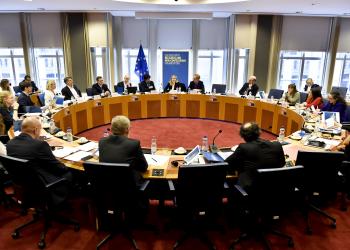Exploring the role of religion in Europe, BIC hosts event at European Parliament
The Baha’i International Community (BIC) is seeking a new kind of dialogue in the world, one that is more consultative, unifying, inclusive and one in which new approaches and new thinking can emerge. In spaces at the United Nations and numerous regional organizations, this pursuit is leading to promising developments.
Policy makers, practitioners and academics gathered in Brussels, Belgium on 6 May for a roundtable to explore the changing religious landscape in Europe and to reconsider the role that religion can play in helping European societies address various contemporary challenges.
“It’s unrealistic to address the issues currently facing humanity and Europe without trying to overcome patterns of fragmented thought that often characterize public discourse. However difficult this seems, we will need to start forming a collective vision of the future of our society,” said Rachel Bayani, Representative of the Baha'i International Community in Brussels at the event co-organized by the BIC, European Parliament, and the University of Groningen.
“One of the areas of fragmentation in thinking today is the discourse on the role of religion, whether in Europe or in the world at large. The challenge is to create a meaningful conversation where we all take the time to question our own paradigms, patterns of thought, and assumptions and to create a discourse on the role of religion in European society which is nuanced, informed, and dispassionate.”
The event was structured so that an academic’s presentation on a subject was followed by a response by a European policymaker, who would then explore the implications and challenges of that subject for policy. A rich discussion ensued between each presentation.
The event was part of the Article 17 dialogue intended to facilitate discourse between the European Parliament and religious and philosophical organizations. It was organized under the patronage of First Vice-President of the European Parliament, Mairead McGuinness. The Administrative Coordinator of the European Parliament’s Article 17 Dialogue, Fearghas O’Beara also attended the forum.
Benjamin Schewel, a lecturer from the University of Groningen, explored various definitions and understandings of secularism during the roundtable. For instance, secularism can mean the exclusion of all expressions of faith in the public sphere. Alternatively, it can also be a way to protect diversity of various religious and non-religious belief systems and their public expression.
“The European Union is a secular political entity. But what precisely this secularity means is not fixed in stone,” explained Dr. Schewel.
“It rather evolves alongside the understanding of decision-makers, thought leaders, civil society actors and citizens. Accordingly, one of the major tasks that stands before all involved parties is to creatively re-imagine what secularism can mean so that the ideal can best serve the whole of European society today.”
He evoked the metaphor of a road and its guardrails.
“The guardrails do not tell us what direction in which to build the road,” he explained.
“Similarly, secularism can provide certain limits and safeguards within European societies, but it cannot itself answer the deeper questions about where society is headed and what kind of society we want to build.”
It was these deeper questions, he argued, to which religion can contribute insights and its community-building powers. Among other topics discussed was religious heritage and the evolving role of places of worship in Europe. With fluctuations in congregation sizes, religious communities are searching for new meanings and functions for historic churches and synagogues, explained Todd Weir, a professor from the University of Groningen’s Faculty of Theology and Religious Studies.
Liam Stephens, a Ph.D. candidate from the Vrije Universiteit Amsterdam’s Department of Political Science and Public Administration and a Baha’i, discussed the role of religion in fostering resilience to radicalization. One contributor to radicalization is young people’s search for purpose, Mr. Stephens noted. Religion, he asserted, serves as a powerful source of a higher and altruistic purpose that motivates constructive action within individuals and communities.
“For vast numbers of the world’s population, religion offers a source of love, hope, meaning and solidarity, and helps to overcome apathy and despair.”
The open, exploratory discussion freed participants from the pressure of making immediate policy decisions and opened a distinctive conversation which many expressed hope would be replicated.
One idea appeared certain for all present—that all human groups are searching for meaning and for a vision of the future. “This common aspiration is a powerful point of unity,” Ms. Bayani reflected.
--
An original version of this story appeared on the Baha’i World News Service
